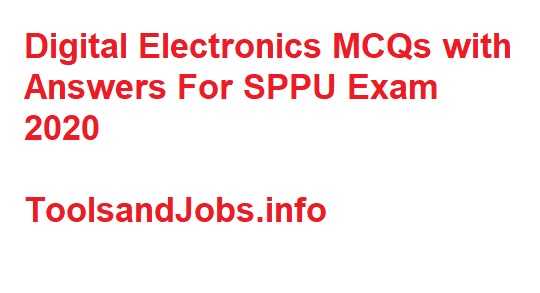Digital Electronics MCQs of Engineering Questions. This mcqs are useful in your university Sppu exams, placements exams, GATE and others.
Click to read part 1 of Digital Electronics MCQs for SPPU exam 2020
Before solving this mcqs i suggest you must read this for better concept.
1. In a 4 input OR gate, the total number of High outputs for the 16 input states are
a. 16
b. 15
c. 13
d. none of above
Ans: b
2. The 74LS08 chip contains ---------- gates.
a. 4
b. 5
c. 6
d. 8
Ans: a
3. A 14 pin AND gate IC has ---------- AND gates
a. 8
b. 6
c. 4
d. 2
Ans: c
4. A 14 pin NOT gate IC has ---------- NOT gates
a. 8
b. 6
c. 4
d. 2
Ans: b
5. Logically, the output of a NOR gate would have the same Boolean expression as an:
a. NAND gate immediately followed by an INVERTER
b. OR gate immediately followed by an INVERTER
c. AND gate immediately followed by an INVERTER
d. NOR gate immediately followed by an INVERTER
Ans: b
6. Which of following are known as universal gates?
a. NAND & NOR
b. AND & OR
c. XOR & OR
d. none
Ans: a
7. The number of bits in a nibble is.
a. 16
b. 5
c. 4
d. 8
Ans: c
8. Which of the following binary numbers is equivalent to decimal 10.
a. 1000
b. 1100
c. 1010
d. 1001
Ans: c
9. Numbers are stored and transmitted inside a computer in.
a. binary form
b. ASCII code form
c. decimal form
d. alphanumeric form
Ans: a
10. Logic gates are the examples of___.
a. LSI
b. MSI
c. SSI
d. any other
Ans: c
11. MUX is an example of____.
a. LSI
b. MSI
c. SSI
d. any other
Ans: b
12. The term VLSI generally refers to a digital IC having
a. more than 1000 gates
b. more than 100 gates
c. more than 1000 but less than 9999 gates
d. more than 100 but less than 999 gates
Ans: a
13. The observation that a bubbled input OR gate is interchangeable with a bubbled output AND gate is referred to as:
a. a Karnaugh map
b. DeMorgan's second theorem
c. the commutative law of addition
d. the associative law of multiplication
Ans: b
14. What value of A, B, C, and D satisfy the following simultaneous Boolean equations?
A+AB = 0,
AB = AC,
AB +AC +CD =CD.
a. A = 0, B = 0, C = 0, D = 1
b. A = 1, B = 1, C = 0, D = 0
c. A = 1, B = 0 C = 1, D = 1
d. A = 1, B = 0, C = 0, D = 0
Ans: a
15. AB+AB’=
a. B
b. A
c. 1
d. 0
Ans: b
16. Boolean Algebra obeys
a. commutative law
b. associative law
c. distributive law
d. all of the above
Ans: d
17. The first contribution to logic was made by
a. George Boole
b. Copernicus
c. Aristotle
d. Shannon
Ans: a
18. One of DeMorgan's theorems states that A’+B’=(A.B. ’. Simply stated, this means that logically there is no difference between:
a. a NAND gate and an AND gate with a bubbled output
b. a NOR gate and an AND gate with a bubbled output
c. a NOR gate and a NAND gate with a bubbled output
d. a NAND gate and an OR gate with a bubbled input
Ans: d
19. According to commutative law of addition:
a. AB = BA
b. A = A + B
c. A + B = B + A
d. A + (B + C. = (A + B. + C
Ans: c
20. Which of the examples below expresses the commutative law of multiplication?
a. A + B = B • A
b. A • B = B + A
c. A • (B • C. = (A • B. • C
d. A • B = B • A
Ans: d
21. From following which Boolean Expression is not valid:
a. A . 0 = A
b. A . 1 = A
c. A . 0 = 0
d. A . A = A
Ans: a
22. Which of the following Boolean algebra rules is correct?
a. A.A' = 1
b. A + AB = A + B
c. A + A'B = A + B
d. A.(A + B. = B
Ans: c
23. Which of the examples below expresses the distributive law of Boolean algebra?
a. A • (B • C) = (A • B) + C
b. A + (B + C) = (A • B. + (A • C.
c. A • (B + C) = (A • B) + (A • C)
d. (A + B) + C = A + (B + C)
Ans: c
24. When simplified with Boolean Algebra (x + y. (x + z) simplifies to
a. x
b. x + xy + z
c. x + yz
d. x + yz
Ans: d
25. A + A.B =
a. B
b. A.B
c. A
d. A or B
Ans: c
26. A.0 =
a. 1
b. A
c. 0
d. A or 1
Ans: c
27. (A + B.C. =
a. A.B + C
b. A .B + A.C
c. A
d. (A+B. (A+C.
Ans: d
28. Which is correct?
a. A.A = 0
b. A + 1 = A
c. A + A' = 1
d. A'.A' = 0
Ans: c
29. The logical expression Y = C + C'B is equivalent to
a. Y = C + B
b. Y = CB
c. Y = C' + B
d. Y = C + B'
Ans: a
30. The logical expression Y = A + AB is equivalent to
a. Y = A + B
b. Y = A
c. Y = A' + B
d. Y = A + B'
Ans: b


